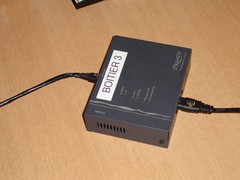
 In addition to some leisure reading, I've also read a couple of tech books in recent months. I was given a copy of Ilia Alshanetsky's book php|architect's Guide to PHP Security (signed by Ilia himself :) and also a copy of Chris Shiflett's book Essential PHP Security.
In addition to some leisure reading, I've also read a couple of tech books in recent months. I was given a copy of Ilia Alshanetsky's book php|architect's Guide to PHP Security (signed by Ilia himself :) and also a copy of Chris Shiflett's book Essential PHP Security.
I like both books, and I'm not just saying that because the authors are friends of mine. Both books are short, with Ilia's book weighing in the heavier of the two. They're written in different styles; Chris very clearly presents the most common styles of web application attacks and explains how they work and what you should look out for, and how to defend against them. Ilia's book is more of a whirlwind exploration of a lot of different attacks coupled with (fairly specific) examples of how to counter them, while at the same time considering application usability based on his experiences with FUDForum. He also talks about the use of honeypots to draw attackers away from important or sensitive areas of your site.
Chris' book is easier to read, and although it is the shorter of the books, it will help instill the right kind of security thinking that will serve the reader very well. Ilia's book is much more comprehensive, although the very dense writing style can make it a bit harder to read and use as a reference.
If I had to recommend just one book, I'd find it hard. If really pushed, I'd probably suggest that Chris' book be recommended for more junior developers and Ilia's for more senior developers. I'd actually recommend both books to anyone who's really serious; use Chris' book as an introduction to firmly set you on the right track and then follow up with Ilia's book for some more advanced techniques.
 I read SQL Server 2005 Service Broker Beta Preview on the flight back from Paris. I picked this up from the Microsoft booth at the Zend Conference. In truth, I only read it because I'd run out of reading material and it was still stashed in the side pocket of my suitcase. This book talks about the Service Broker feature in the new version of SQL Server. This is a reliable, optionally distributed, message queuing facility that ensures message ordering. You're either thinking "Big Deal", "Eh?" or "Neat". This facility is ideal for implementing workflows in a very robust manner. If you're on Windows and have a project coming up in this space, it's worth a read. It sounds like pretty neat stuff; enough so that I might even find some time to play around with it and write some examples in PHP + PDO.
I read SQL Server 2005 Service Broker Beta Preview on the flight back from Paris. I picked this up from the Microsoft booth at the Zend Conference. In truth, I only read it because I'd run out of reading material and it was still stashed in the side pocket of my suitcase. This book talks about the Service Broker feature in the new version of SQL Server. This is a reliable, optionally distributed, message queuing facility that ensures message ordering. You're either thinking "Big Deal", "Eh?" or "Neat". This facility is ideal for implementing workflows in a very robust manner. If you're on Windows and have a project coming up in this space, it's worth a read. It sounds like pretty neat stuff; enough so that I might even find some time to play around with it and write some examples in PHP + PDO.


 In addition to
In addition to  I read
I read  The hotel was ok though, and they had free wifi access for guests. It was WEP protected and when I asked about the WEP key, the guy at the desk said he didn't have any more boxes. Strange. The next night I was lucky and managed to obtain a box... it turns out that they use a little box with a wifi-to-ethernet bridge in them; one end of the box plugs into the AC outlet in the wall, and the other into your ethernet port. Interesting approach; it means that they don't need to worry about giving out their WEP keys, can provide service to people without wifi cards and that they don't need to plumb in wired ethernet either.
The hotel was ok though, and they had free wifi access for guests. It was WEP protected and when I asked about the WEP key, the guy at the desk said he didn't have any more boxes. Strange. The next night I was lucky and managed to obtain a box... it turns out that they use a little box with a wifi-to-ethernet bridge in them; one end of the box plugs into the AC outlet in the wall, and the other into your ethernet port. Interesting approach; it means that they don't need to worry about giving out their WEP keys, can provide service to people without wifi cards and that they don't need to plumb in wired ethernet either.